

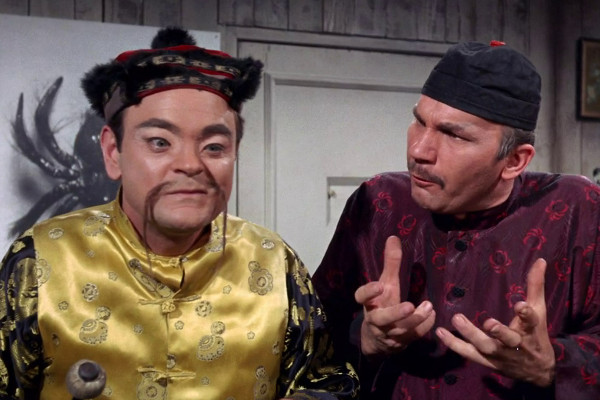
An episode that features white actors using prosthesis to appear "Chinese", putting on stereotypical accents, is bound to raise eyebrows in 2018. And with a very basic "misplaced microfilm" plot and some of the broadest characters yet, it's not even offensive enough to engage, instead merely quite childish.
However, while discussing the notion of whether or not this episode is "racist", then or now, it also opens up the discussion on how minorities were featured in 1960s US TV. Very few non-white people get a line in The Monkees, but at the time it was made, around 88% of the US population was white. (Today it's around the 70% mark). Even the Los Angeles where the ficticious Monkees live, which is today around 70% non-white (largely Hispanic) was, at the time, an area with a much greater Caucasian population.
America doesn't have a large Asian population, comparatively speaking, with even today just around 5% of the country's demographics reaching that number. When Monkee Chow Mein was made, it was less than a single percent, with lower than 1.5 million of a 200 million populace. Mike Nesmith, the Monkee who gets the line "orientals are a curious people", was witness to much racial bigotry, coming from the Southern States. In his autobiography he notes: "When the little kids in my all-white elementary school started using racial epithets and saying that some races were better than others, I recoiled. [...] I could not understand subtleties then, but I could spiritually sense that something was terribly wrong and was disturbed by it."
The reasonably high ranking of this episode is almost entirely due to its intrigue as an historical document. While the entire series is understandably dated, this is one of the few which would almost certainly never be made today. Add to this Davy in disguise as an "Italian", and it's a very intriguing edition of questionable values, one that the return of "The Monkeemen" can't dilute.
Song: "Your Auntie Grizelda"
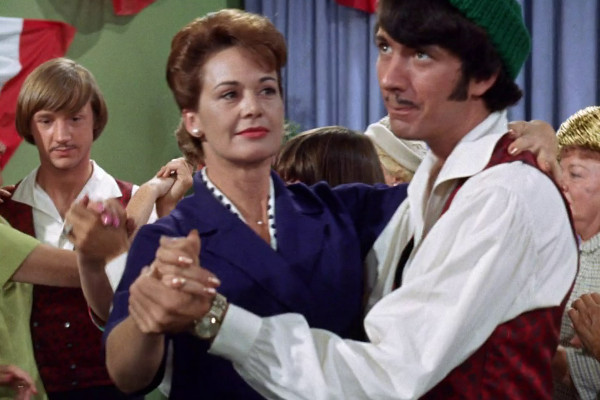
The Monkees are unwittingly roped into signing a lifetime contract and use their wits to try to break out of it. The episode features more self-reflexive humour than many other episodes, with Davy observing how much a dance number would cost, and Micky going into the writers' room to ask for fresh ideas. (The writers are revealed to be four enslaved Chinese men, watched over by a man with a whip).
One of the extras in the episode is Mike Nesmith's own mother, who, as pictured, dances with him during the second romp. A frequent trivia question, she did, indeed, invent liquid paper. In further trivia, then Micky refers to himself by his full name, George Michael Dolenz, the only time he would do so before HEAD.
Songs: "I'll Be Back Up on My Feet" (original version), "I'm a Believer"
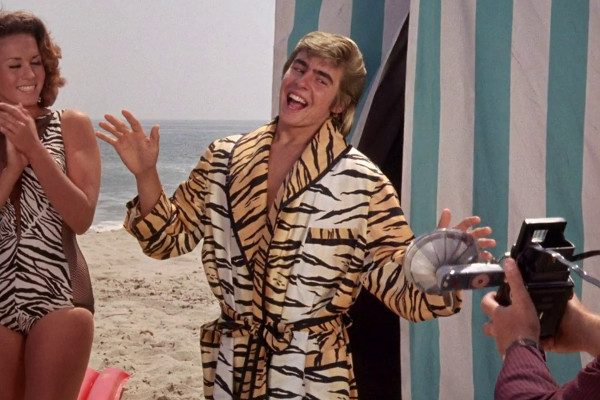
The Monkees break into the movie business when a film director wants them for his beach picture ("It's about sadness... and pain... and cruelty. All the things that make life worthwhile.") Appearing as extras in a film with an arrogant star, it's ironic that the man playing the star (Bobby Sherman) was a pop star without hits, until he became successful with his music in 1969, around the same time the Monkees' career started to stall.
It's a fun episode, albeit something of a toothless satire, but it's impossible now to imagine just how revolutionary a TV show with long-haired men was at the time. Consequently, devoid of context, it's preferable to just concentrate on the gags. The episode has a pretty funny, groan-worthy piece of nonsense where the Monkees draw straws to decide which one of them will replace Sherman after he's stormed off the set... which involves them literally drawing straws on a piece of paper.
The episode ends with a tag-on, where Davy and Mike both tell random anecdotes before being asked about whether they play their own instruments on tour. Their indignation does seem somewhat contrived, there to counter the backlash that was rising against them for being manufactured. Ironically, although the August 1966 filming pre-dated Mike's January 1967 interview with the Saturday Evening Post ("The music had nothing to do with us. It was totally dishonest."), the April 1967 airdate would make it appear to be a direct response.
Songs: "A Little Bit Me, a Little Bit You," "Last Train to Clarksville," "Valleri" (original version)
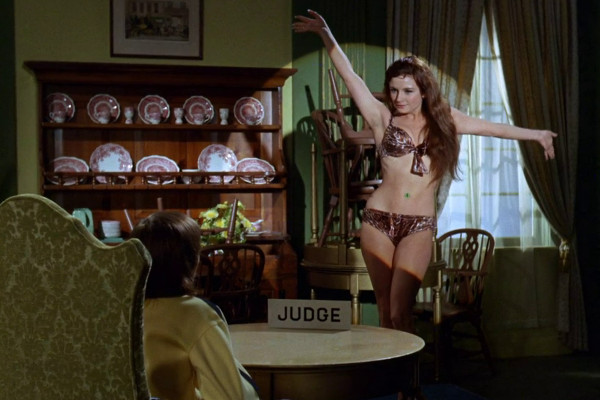
Also known as "Davy and Fern", this episode is special in that it features the Monkees actually playing live during the opening, with a rendition of "Stepping Stone". The actual content of the episode features Davy regularly "falling in love" with a succession of women, largely leading to non-hilarious consequences, though it's harmless filler.
Network censorship originally saw scenes where Fern (Kelly Jean Peters) shows her cleavage and parades in a bikini obscured with a smeared camera lens. Repeat broadcasts let it go through unaltered, which is how it appears on the DVD and BluRay releases. Also look out for an odd moment near the end where Micky improvises palm reading Mike, mutters something almost unintelligible, then looks off camera as they all break into laughter.
Songs: "(I'm Not Your) Steppin' Stone" (performed live on set), "I'm a Believer"
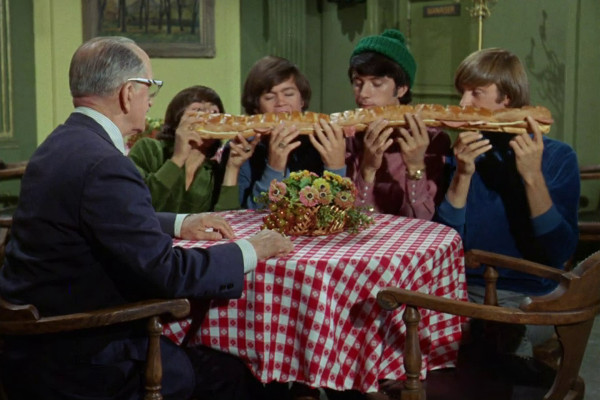
There's a debate to be had as to why The Monkees isn't as funny in the modern age as it was when it first aired. The suggestion that it's because the style of humour has dated perhaps doesn't quite cut it, as the series was broadcast well into the 1980s in the UK and managed to be consistently hilarious. Although the mix of day glo, cartoonesque acting and canned laughter is archaic, it wasn't a detraction for two decades past its original air date.
The real answer, perhaps, for those who no longer find it particularly amusing, is simply that the viewer got older. Here at The Anorak Zone The Monkees was first seen at the age of around eight years old, which was the perfect target audience. Seen much later and it seems an often banal package for underrated music. This said, Monkees á la Carte has a succession of corny gags which are somewhat amusing, even if the energy of this particular episode does start to falter the longer it goes on.
There's also a series of directorial decisions that place this above the norm, with what appears in some moments to be hand-held footage. Somewhat macabrely, it ends with the murder of several gangsters, indirectly caused by Micky, which makes it the only episode other than season two's Everywhere A Sheik Sheik to feature death. (Unless you also count the death of the "Two-Headed Org" from The Frodis Caper, which would make it one of three).
Songs: "(I'm Not Your) Steppin' Stone," "She"
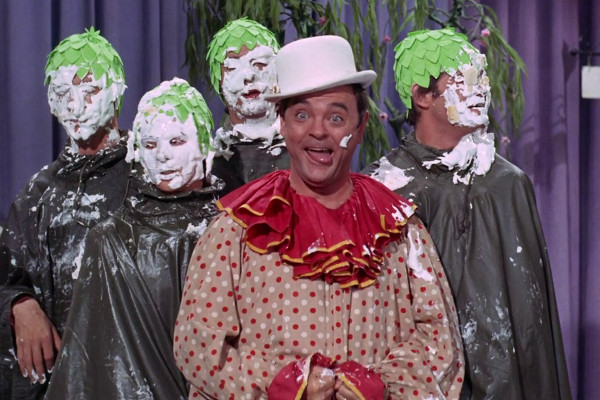
A parody of the vacuous nature of network television, with children forced by cue cards to portray enthusiasm. As discussed with other episodes, attempting satire when you're in a show for 12-year-olds with a canned laughter track and cereal adverts isn't an ideal base to work from, but at least they tried. Spoofs of TV shows including What's My Line? and Batman vary in laughs, with this being the second "superhero" routine in the series (after the first of three Monkeemen appearances) and generates about the same amount of smiles. Which is, sadly, not many, though this is still an above-par instalment.
Joey Forman (Dragonman from Monkee Chow Mein) plays the titular character, presumably a spoof of Captain Kangaroo. He resents the Monkees so much that he tries to turn the audience against them, at one stage getting an entire gang of kids to chase them through the streets. Micky calms them down by reading them a story, starting with "Once upon a time in the land of Kirshner..." As Don Kirshner was soon off the scene (he of "Mike punches a wall and tells him it could have been his face" infamy) repeats (or "reruns") featured a dub changing it to Schneider, for creator/co-producer Bert Schnieder.
Songs: "Valleri" (original version), "Your Auntie Grizelda"
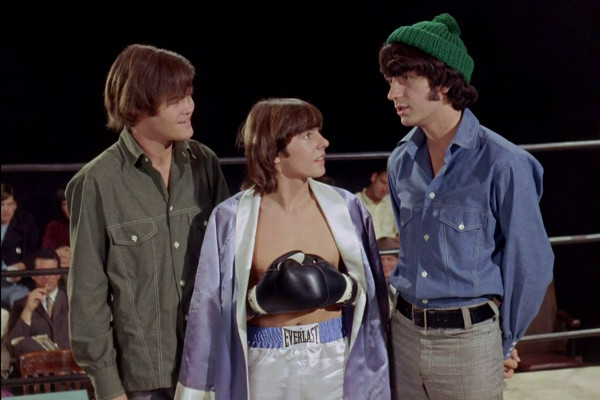
In September 1965 writers Gerald Gardner and Dee Caruso crafted an episode for The Smothers Brothers Show known as "Halo In The Ring". Featuring the exploits of a fighter unknowingly being set up by gangsters, it aired in November 1965, where the nearest (unconfirmed) fixed fight had been the second Ali-Liston bout from May of that year.
There's no suggestion that what is now a very dated comedy story was using the "phantom punch" fight as its source material, but when the writers lifted their own script wholesale for this episode, the opponent notably talks in rhyme and declares "I am the greatest". Entire lines from the original script - which had aired just over a year before this went into production - are reused, including the bizarre tale of Davy bragging about beating up a girl at school.
The basic theme of this episode was notably reused for the superb Monkees film HEAD, in which Davy takes a beating at the hands of Sonny Liston. It's claimed that Jones had boxed professionally in real life, and, certainly, while his "boxing" is clearly fake and played for laughs, he does appear to have a natural boxing stance. Sadly, this can't be confirmed, as there is currently no record of Davy's supposed pre-Monkees career on BoxRec, or, for that matter, his own autobiography. One final piece of trivia... Davy's complaint about Peter's "bloody" pistachio nuts at the start of the episode make it the only Monkees episode to feature (mild) swearing.
Songs: "Laugh", "I'll Be Back Up on My Feet" (original version)
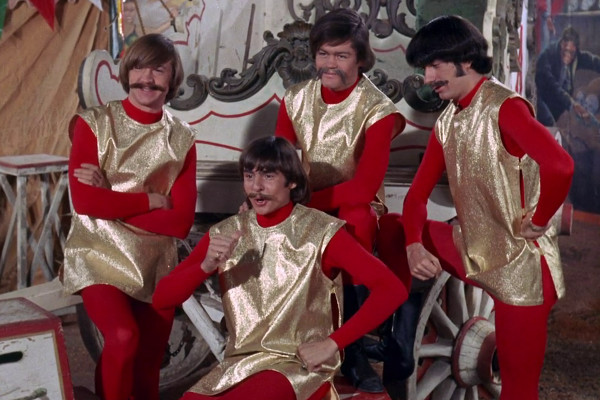
"Hey, I haven't been to a circus since I was a kid!"
The Monkees was never afraid to get "meta", but here Micky's past as the star of 1950s show Circus Boy gets plenty of nods, including Dolenz singing the theme tune to the show he starred in as "Mickey Braddock". ("What IS that?" "It's the theme song for an old TV series" "I know it from somewhere...") Micky's autobiography I'm A Believer was looked at in slightly more depth during the overview of Season Two, but it's worth noting here that it covers his time on Circus Boy, including being assigned to a child psychiatrist after the series was cancelled.
Monkees at the Circus sees the group try to save a travelling circus for purely altruistic reasons, and dress up as Frenchmen with stick on moustaches as the circus owners don't like rock stars. Although quite a lame sequence, Mike being on the verge of genuine laughter makes it funnier, and it's all very innocent stuff, lacking in what you might call the "edge" of normal Monkees episodes, if such a term didn't seem ridiculous.
Although two Monkees episodes did not have recorded viewing figures (Too Many Girls and The Monkees at the Movies), the 12.08 million that tuned into this episode were almost certainly the largest audience the series drew, with a massive 33.3% audience share.
Songs: "Sometime in the Morning", "She"